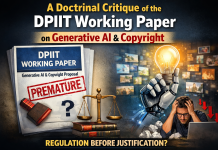As per the notice published on the IPRS website, its 1st/ 2018-19 Extra-Ordinary General Meeting (EGM) will be held on April 11, 2018 to approve the ‘Tariff Scheme’ framed and presented by the Governing Council. The notice further reads that “This resolution is pursuant to the requirements under the Copyright Act, 1957 read with the Copyright Rules, 2013 and not under the provisions of the Companies Act, 2013.
Note: Any Member having objection to the “Tariff Scheme”, is entitled to withdraw his authorization given to the Society or surrender/relinquish his Membership of the Society”.
The proposed tariff scheme can be accessed here and the existing tariff scheme can be accessed here.
Surprisingly, the EGM has no mention of the ‘Distribution Scheme’ on its agenda. The IPRS page on Distribution Scheme states “Distribution Scheme is in the process of update”.

Rule 56 of the Copyright Rules, 2013 requires a copyright society to frame the Distribution Scheme setting out the procedure for distribution of royalties specified in the Tariff Scheme among the members whose names are entered in the Register of Authors and Owners for the approval of the General Body of the society, as soon as may be, but in no case later than three months from the date on which a copyright society has become entitled to commence its copyright business.
Considering IPRS received its registration on November 28, 2017, three months elapsed on February 28, 2018.
Rule 66(f) of the Copyright Rules, 2013 clearly requires that every society shall make available on its website- “all schemes of the society”. Absence of the Distribution Scheme from the website of IPRS therefore seems to be a clear violation of Rule 66(f).
I did not come across any provision in the Act or the Rules giving any relaxation to the three-month stipulated period for compliance with the Tariff Scheme and Distribution Scheme.
Interestingly, Rule 53 of the Copyright Rules, 2013 which provides for cancellation of registration of a copyright society mentions non-compliance with publication of Tariff Scheme under Section 33A as a ground for cancellation but makes no mention of distribution scheme. I fail to understand the logic behind the said distinction, but our draftsmen would have known better.
I am also not clear as to how is the proposed new tariff scheme being made effective from April 1, 2018 when the EGM to discuss that tariff scheme is on April 11, 2018.
What about the AGM?
Rule 61(1) further requires that every copyright society shall hold a General Body meeting of all its members as its annual General Body meeting before the 31st of March every year. As per the details available on the IPRS website and the Ministry of Corporate Affairs, the last AGM of IPRS was held on September 29, 2017. Further, Rule 61 (4) requires that the notice for General Body meeting shall be issued before twenty-one days of the meeting and it shall and specify the agenda, time, date and address of the venue of the meeting and the same shall be posted on the website of the society.
The Articles of Association of IPRS under Article 11 provide that “The Society shall in each year hold a General Meeting as its Annual General Meeting of all Members, in addition to any other meetings in that year, and specify the meeting as such in the notice calling it. The Annual General Meeting shall be called by the Company within a period of six months from the date of ending of its financial year or fifteen months from the date of last Annual General Meeting of the Society, whichever is earlier. The Annual General Meeting shall be held at such time and place as the Board shall determine.”
Given that IPRS has not completed its one year from registration, this may not be a violation under provisions of the Companies Act, 2013. However, the language in Rule 61 seems to be pretty clear and has no reference of the date of AGM being connected to the period when the society received its registration. I therefore have reason to believe that non-holding of the AGM prior to March 31, 2018 is in contravention of Rule 61(1) of the Copyright Rules.
As pointed out in my posts here and here, there seem to be some non-compliance issues by IPRS and if these are not rectified in time, these issues are bound to haunt IPRS in all the forthcoming litigations or even lead to its cancellation as a copyright society.
There are a lot of unanswered questions on the functioning of IPRS post its re-registration. What would be the consequence of non-compliance of these statutory provisions would have to be seen.
P.S. If I have interpreted any of the provisions incorrectly or missed out on any information which is publicly available, please do provide your valuable comments. The Memorandum of Articles of IPRS also does not seem to be accessible on their website. If anyone has a copy of it, please do send it across to me.
Image source: here













Dear Anushree,
My attention has been drawn to your blogpost dated March 28, 2018 titled -“IPRS EGM SCHEDULED ON APRIL 11, 2018- DISTRIBUTION SCHEME MISSING FROM AGENDA; AGM NOT YET CONDUCTED” (url-https://iprmentlaw.com/2018/03/28/iprs-egm-scheduled-on-april-11-2018-distribution-scheme-missing-from-agenda-agm-not-yet-conducted/)
It appears that the link to the IPRS Distribution scheme was unavailable for a temporary period which has now been repaired. The distribution scheme of IPRS is available on the IPRS website. This distribution scheme is the IPRS scheme approved years ago. Apart from the current scheme, IPRS is also working on aligning the scheme with international best practices in consultation with CISAC. I expect that this should be finalised sometime this month and once approved by the General Body will be uploaded on the IPRS website.
The actual intention of my writing to you is to convey my genuine appreciation for your criticism which IPRS, its Board and I as the CEO of IPRS take as constructive in intention- after years of ill-advised legal disputes, IPRS finally now represents a strongly unified body of stakeholders- authors (lyricists), music composers and music publishers. All the relevant stakeholders – authors, composers and music publishers are engaged jointly along with the IPRS Board and Executive to ensure that IPRS fully embraces good corporate governance norms, adopts and effectuates a strict legal compliance policy. All above named stakeholders exercise collective control over IPRS. If IPRS is to be successful it must not only be transparent but also positive and receptive to well meaning criticism. Consequently, your blog posts help IPRS to remember that the world is watching and expects IPRS to “walk the talk” and consequently we must constantly strive to do better for our members as well as end users. IPRS’ restructuring certainly has not been easy given the present construct which requires a balance between the private right imperative and regulatory imperative. I see your and other blogs such as SpicyIP as watchdogs which if viewed in the correct perspective can only help IPRS be more effective for its members and for lovers of music including end users of music. We will certainly persevere to do better. So thank you again!
If you are ever in Mumbai, it will be a pleasure to have you over at the IPRS office for a cup of tea and discuss what IPRS is up to! Please treat this as a standing invitation.
Warmly,
Rakesh
Rakesh Nigam
Chief Executive Officer
Indian Performing Right Society Limited